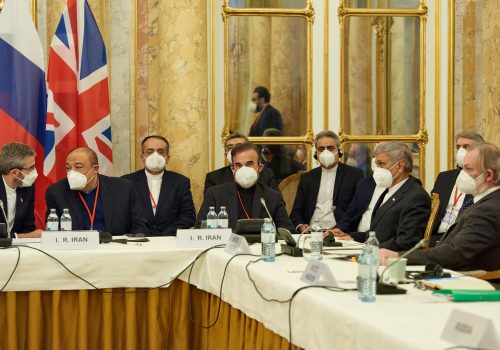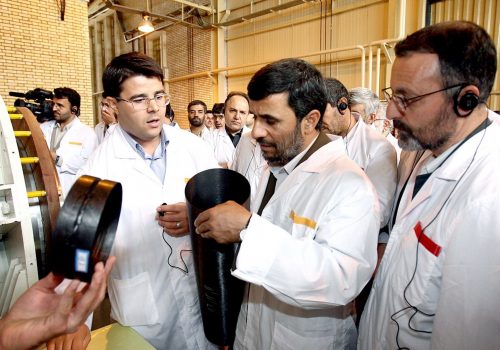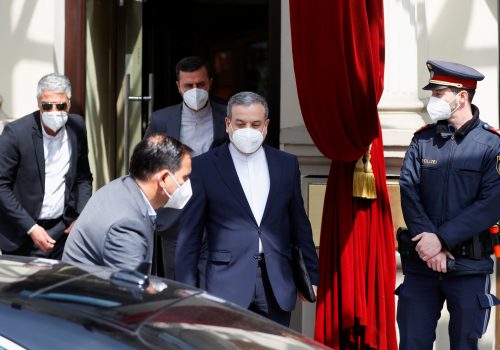China is the real barometer of the state of Iran nuclear talks in Vienna
After a five-month pause following Iran’s presidential election in June, the nuclear talks in Vienna recommenced on November 29. Yet, the absence of direct talks between Washington and Tehran—along with Iran’s maximalist demands—casted a shadow on the success of the negotiations. The seventh-round ended on December 3 without any significant breakthrough, further endangering a revival of the Joint Comprehensive Plan of Action (JCPOA).
Arguably, China, which played an important if secondary role during the final leg of nuclear negotiations during 2013-2015, is the most suited of the P4+1—Britain, China, France, Germany, and Russia—to exert effective leverage to bring Tehran back to compliance now. However, in the past months, Beijing has remained on the sidelines, maintaining dialogue with Tehran and Washington without enthusiastically embracing its potential mediation role—unlike, for instance, Russia, which has seemed much active than China through its compromise-seeking position at the negotiations and its representative in Vienna, Ambassador Mikhail Ulyanov, who has been engaging with his Twitter audience on the matter.
However, according to a Wall Street Journal report published on December 6, the Chinese delegation has been more active during the latest round of talks. Sharing with other parties a certain degree of frustration towards Iran’s unconstructive demands, Beijing’s chief negotiator pressed his Iranian counterpart to “significantly streamline” the two draft texts containing Tehran’s proposals on sanctions removal and nuclear commitments.
Beijing has, in the past, appeared more focused on protecting and eventually advancing its bilateral interests in the Persian Gulf region, in a path that culminated in March with Foreign Minister Yi Wang’s grand tour of the Middle East. During the same month, Tehran and Beijing signed the long-rumored 25-Year Comprehensive Strategic Partnership agreement, which brought the two countries closer than ever despite lacking material substance. At the same time, China has continued to import a significant quantity of Iranian oil via intermediary countries. This undermines the Donald Trump administration’s attempt at zeroing Iran’s petroleum exports as part of its “maximum pressure” policy, but gives Beijing the most leverage over Iran’s negotiating stance.
The China-US-Iran triangle at play
Despite facing presidential transitions in the US and Iran during 2021, China’s discourse around the Iran nuclear accord remains consistent. Beijing has offered Iran a political harbor to amplify its opposition to “US unilateralism and its bullying policies on the international stage.” Nonetheless, Beijing hasn’t abandoned its peculiar equidistance.
Following Tehran’s announcement that it would return to the negotiations in Vienna after a five-month hiatus, Chinese Foreign Minister Wang welcomed the decision and called on Iran to return to compliance. A similar tone emerged from the Chinese readout of the November 15 trilateral meeting between Chinese, Russian, and Iranian deputy foreign ministers. The consensus reached was ultimately another call for returning to compliance. It is on these grounds—Beijing’s support for reviving the JCPOA—that the Joe Biden administration is trying to reach out to China.
In his readout from the November 16 Biden-Xi Jinping meeting, US National Security Advisor Jake Sullivan described the Iranian nuclear issue as one of the “immediate challenges where the US and China have worked together historically and are now facing important moments.” Sullivan’s words came as no surprise for those who have closely followed the Biden administration’s attempt to engage China in nuclear diplomacy with Iran.
Earlier in the year, in March, during their first face-to-face meeting since Biden took office, Biden and Xi agreed that their interests overlap on Iran. Similarly, US Special Envoy for Iran, Rob Malley, pursued remarkably intense diplomatic activity, reaching out multiple times—at least once in February and twice in November—to Chinese Vice Foreign Minister Ma Zhaoxu. Here, the break from the Trump administration has been visible and confirmed by the fact that, on a key issue such as Beijing’s oil imports from Iran, the Biden team has preferred approaching China diplomatically rather than through the enforcement of US sanctions.
In his remarks following the seventh round of talks in Vienna, the Chinese foreign ministry spokesperson Zhao Lijian adopted a more positive tone than the Europeans and Americans, who shared concerns that Iran wasn’t serious about the nuclear talks. He stressed that what remains is the necessary first step of the US lifting “all illegal unilateral sanctions against Iran,” upon which Tehran should then return to compliance with the nuclear provisions. The Chinese foreign ministry spokesman also called on all parties to exercise restraint and “avoid drastic words and deeds that may disrupt diplomatic efforts.”
Zhao’s words signal that Beijing is still shaping its public reaction to the current state of the nuclear negotiations around the need to assure Iran a degree of political support. Yet, a growing sense of urgency is detectable.
A matter of perceived urgency
China still evaluates the JCPOA as an effective nonproliferation tool. Perhaps even more important is the assessment that originally motivated Beijing’s support for a peaceful resolution of the Iranian nuclear issue: a war with Iran would be devastating to China’s interests and security.
Given how much more profound the Chinese footprint in the Persian Gulf is now compared to a decade ago, the value that Beijing puts into regional stability and, thus, the direct and indirect costs of a conflict have arguably increased. Nonetheless, the status quo that has emerged in the Persian Gulf in the aftermath of Trump’s withdrawal from the Iran deal in May 2018, while being turbulent and precarious, has caused little harm to China.
Remarkably, the enduring tensions that have shocked the Persian Gulf since 2019 have spared Beijing’s interests. Iran never targeted vessels associated with China, signaling that the Islamic Revolutionary Guard Corps understands that the country remains one of the few—if not the only—major powers that can offer Iran some valuable political and economic capital. On the other side, Beijing has acted carefully to navigate the tensions without being dragged into them, advancing its interests in the region freely and successfully.
Overall, the post-2018 status quo has proved significantly less disruptive to China than it could have been. Consequently, the diplomatic effort and costs associated with taking up a more central role in the Iranian nuclear issue outweigh the expected benefits. While this might be considered short-sighted, it reflects the hard fact that the Persian Gulf remains a second-rank priority for China. Consequently, the emergence of more urgent and diplomatically costly crises—such as the coronavirus pandemic, the US withdrawal from Afghanistan, and tensions over Taiwan—has further diverted China’s diplomatic efforts away from the Iranian nuclear issue. In other words, within Beijing’s process of allocating scarce diplomatic resources, the JCPOA suffers from both the status quo and being outweighed by several more compelling issues.
What pushes China to increase its involvement in the nuclear talks?
Therefore, it has been the very existence of the JCPOA that has allowed China to divert its diplomatic resources away from the Iranian nuclear question despite the post-2018 tensions prompted by the US withdrawal. In fact, the nuclear accord has not only provided the international community the tools to monitor Iran’s incremental nuclear escalations, but it has also continued to define the perimeter of demands, provisions, and diplomatic objectives related to Tehran’s nuclear program.
Consequently, the risk of a complete collapse of the JCPOA has been the main trigger of increased Chinese diplomatic effort to preserve it. This explains Beijing’s reported efforts to temper Iran’s demands during the last round of talks in Vienna (November 29-December 3), a significant departure from the minimal role played in the precedent rounds.
On the other side, the experience of the pre-JCPOA negotiations reveals another interesting pattern. According to John Garver, an emeritus professor at the Georgia Institute of Technology, China’s role grew in quality and significance only after 2013, with Beijing assuming the function of mediator between the US and Iran.
What prompted the change back then? Certainly, Xi’s ascent to power opened up a new, more proactive phase of China’s foreign policy: Iran’s nuclear program was an issue of global concern on which Beijing was well-positioned to mediate between Washington and Tehran. Still, perhaps more prosaically, in 2013, with the election of Hassan Rouhani and the signing of the Joint Plan of Action—the precursor to the JCPOA—the negotiations gained unprecedented positive momentum. At that point, for China, the cost of increasing its mediation effort dropped significantly and not being left out from such a historical achievement of multilateral diplomacy became the priority.
In other words, China’s role in the nuclear talks is a natural barometer of the state of the JCPOA itself: when Beijing increases its involvement in the Iranian nuclear issue, it could either mean that the negotiations are close to succeeding or on the verge of collapsing.
Jacopo Scita is a H.H. Sheikh Nasser al-Mohammad al-Sabah doctoral fellow at Durham University. Follow him on Twitter: @jacoposcita.
Further reading
Mon, Dec 6, 2021
Iran offers less for more as Vienna talks stall
IranSource By Barbara Slavin
More than five months after multilateral nuclear talks with Iran were paused before the country’s presidential elections in June, a new negotiating team arrived in Vienna in late November with additional demands and fewer concessions than its predecessors.
Tue, Dec 8, 2020
A history of continuity in Iran’s long nuclear program
IranSource By Sina Azodi
Iran’s interest in developing a nuclear deterrent is often attributed to the Islamic Republic. However, in reality, this interest predates the 1979 revolution and reflects a deep-seated desire for national prestige and development, as well as a need to deter regional rivals.
Fri, Apr 23, 2021
‘Poison pill sanctions’ are hard for Vienna negotiators to swallow
IranSource By Brian O’Toole
“Poison pill sanctions,” a large list of sanctions that would have been allowed under the 2015 nuclear accord, are clearly the sticking point in the ongoing negotiations and the focus of the technical working groups in Vienna.
Image: The ambassador of the Permanent Mission of the People's Republic of China to the United Nations Wang Qun arrives for a meeting of the Joint Comprehensive Plan of Action (JCPOA) in Vienna, Austria, November 29, 2021. REUTERS/Lisi Niesner


